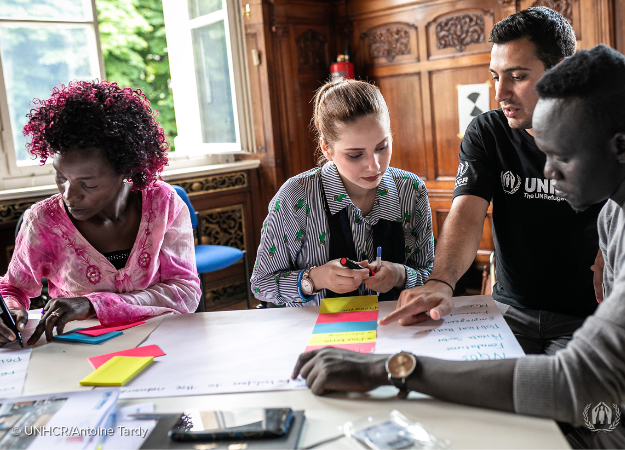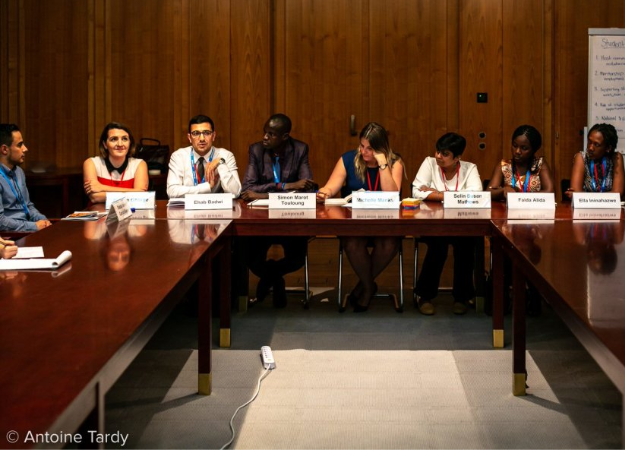“You cannot build peace in a country without building humans.”
Ehab Badwi, 28, says to me on a Skype call about his work advocating for Syrian peace building and refugee advocacy. I contacted Ehab a few weeks prior to our call in an effort to highlight the work many students continue to do during a global epidemic. Ehab was awarded the IIE Scholarship for Syrian Students in 2018 to study at Bard College Berlin but his dedication to help Syrians preceded his university studies. Over the next hour, he shares with me how his life has turned into one where emailing high level UN officials is part of the day-to-day routine all while completing a Bachelor’s degree in Germany.
It seems clear from our short interaction that Ehab has always been a deeply caring person, yet his trajectory once seemed very different. He grew up in Homs, Syria. He graduated with a degree in mechanical engineering from Al-Baath University in 2013. Even as the conflict which started in 2011 continued, his plan was to become an engineer, something he had been working towards since high school. But mandatory military conscription forced him to flee to Ivory Coast in 2013, then Turkey in 2014 where his advocacy would be transformed.

When he first arrived in Istanbul, he wanted to work as a mechanical engineer, but the pay was low, there were no benefits, and he feared taking jobs away from others with work permits. His family remained in Syria and he watched as Syrian youth continued to be disconnected from opportunities for growth and development. In his words “I wanted to do something more gentle and more pressing.” For Ehab this meant advocacy and peace building for the people
and country he still loves and watches sinking further from afar. He started to connect with the UNHCR and the big turning point came in 2015 when he was invited to speak at the 2015 World Humanitarian Summit in Geneva. He travelled to Europe, spoke in front of large crowds about his hopes for Syria and decided to seek asylum in Germany.
After receiving asylum in 2015, he lived in a refugee camp, but sheer luck would connect him with a German family that would take him in as family for the next three years. During that time he worked, took advantage of informal learning opportunities, and focused on learning German. His civil society work was growing as he sought to play an instrumental role in rebuilding Syria. This came to a head when, at the 2016 World Humanitarian Summit in Istanbul, he founded the Syrian Youth Assembly (SYA). Young Syrians at the Summit came together to collectively make their voice heard, organizing for change on behalf of all Syrian youths.
Since 2016, SYA has made instrumental progress in advocating for Syrian youth educational opportunities. In a partnership with Coursera, SYA streamed 120,000 courses in Syria over a two-year period. For Ehab, this further proves that Syrians are thirsty for education. “They like to learn but they missed the opportunity because of the war. They are smart enough to educate themselves but they just need to have the tools.” Since then, Ehab has also contributed to the peace process in Syria by consulting with governmental bodies and holds this mission as his responsibility “to build a road map which shows how young people can participate.”
Yet, as he worked on peace building and ensuring Syrian youth had a seat at the table to discussed their fate, a nagging feeling remained. What if he one day found himself in a meeting and didn’t have the background knowledge to discuss a specific issue? How could he prove himself to be valuable when his education was not in politics and peace building? Or perhaps even “with all of the experience I have, someone with a degree will come and take my position.” Degrees are power and it was time for Ehab to return to school.
He chose Bard College Berlin (BCB) for their English taught degree in Economics, Politics, and Social Thought. But as a private institution, a scholarship would be mandatory. While Ehab’s tuition was covered by BCB’s Program for International Education and Change, IIE’s Student Emergency Initiatives provide Ehab with funds to cover living expenses and other expenses related to his education.

It’s tough to juggle all of these responsibilities. Ehab is not only working towards a second Bachelor’s degree but he is also the CEO of Syrian Youth Assembly, a Youth Representative for the World Organization for Scout Movement, and a Youth Leader at the Tertiary Refugee Student Network, among many other titles. He takes on responsibilities well beyond those normally shared by other 28-year olds but works to remember that
“if the response doesn’t come from us, no one will do the response. No one is advocating for young people. This puts a lot of responsibility on [us] but there is no alternative.”
It doesn’t escape me that this is the burden expressed by many activists. Few are able to organize and find an avenue to make their voice heard. When they do, there is a sense of responsibility to continue the fight until the mission is resolved. But when it comes to rebuilding a country, fighting for the interests of your people – how can this mission be resolved? Ehab decided to start his higher education from the beginning to ensure that his seat at the table is not taken by someone else. He sees the privilege he gained by being able to leave Syria to study and live in peace but feels a deep sense of responsibility to do right by his home country.
But what does it say about our global society when young people, refugees, Syrians have to fight to represent their own interests? There is no lack of existing organizations and governments who focus on rebuilding Syria, providing humanitarian aid, or connecting refugees with education. Still, too few actually employ the people who are affected by the conflict they seek to address. Refugee voices must be heard and heeded to best serve a community in need. Like Ehab, many form their own organizations. They start small and grow strong as it comes to be understood that representation matters.
Ehab has prioritized his education as a tool to do the greatest amount of good for the future of Syria. He wants more refugees to be able to have these same rights. With the great barriers and costs to education, it is increasingly hard to connect refugees to higher education. But when we invest in people and their future, they work to do the greatest good with that opportunity.
Ehab told me, the reason he does this work is simple – “I grew up in a society with the idea that we need to help others.” This isn’t a sentiment unique to him. If we succeed in increasing higher education opportunities for displaced and refugee students like Ehab, we will see new leaders rise up to lift up their communities.
Written by Sixtine Berquist, IIE SEI Digital Media & Advocacy Strategist.
June 4, 2020

